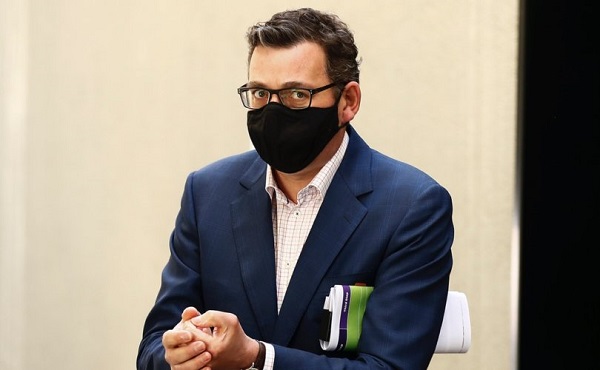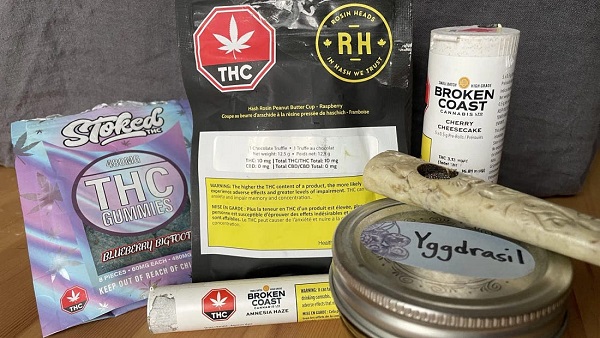espionage
RFK Jr. tells Tucker he would serve as Trump’s CIA director if asked
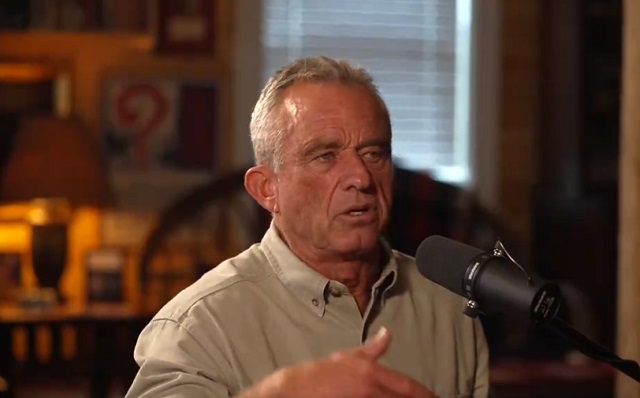
From LifeSiteNews
By Stephen Kokx
Robert F. Kennedy Jr. said it’s unlikely that he would receive Senate confirmation because committee members are ‘just safeguarding that (CIA) directorship and I would be very, very dangerous for those committees.’
Former presidential candidate turned Donald Trump supporter Robert F. Kennedy Jr. told Tucker Carlson this week that he would definitely serve as the director of the Central Intelligence Agency (CIA).
“If you were asked, would you run it?” Carlson asked.
“Yes, I would,” Kennedy replied. “But I would never get Senate confirmation.”
When Bobby Kennedy endorsed Donald Trump last week, he burned his boats. There’s no turning back for him, or for American politics. Here’s his first interview since that happened.
(0:42) RFK Jr. Endorsing Donald Trump
(11:26) Censorship and Pavel Durov’s Arrest
(34:56) America’s… pic.twitter.com/AOQULEvZeX— Tucker Carlson (@TuckerCarlson) August 26, 2024
Kennedy made major news last week when just one day after the Democratic National Convention he endorsed the former president in his bid for the Oval Office.
Kennedy was given a hero’s welcome by Trump at a rally in Arizona, during which he spoke about the need to end childhood illnesses and the “chronic disease epidemic” in America.
.@RobertKennedyJr takes the stage in Arizona! 🔥 pic.twitter.com/qXb3TjJOcJ
— Trump War Room (@TrumpWarRoom) August 24, 2024
Kennedy’s interview with Carlson indicates he has a sober grasp of the power the Deep State has over U.S. politics.
“As you know, the intelligence (agencies) are protected by very, very powerful committees in the Senate and the House,” Kennedy remarked. “And the people who serve on those committees … they’re just safeguarding that (CIA) directorship and I would be very, very dangerous for those committees.”
The pair additionally spoke about other areas of agreement between Kennedy and President Trump as well, in particular Trump’s promise to establish a commission to declassify the remaining documents pertaining to President John F. Kennedy’s assassination in 1963.
“I think everyone at this point knows the truth, which is the CIA is implicated in that. Those documents protect (the) CIA, maybe among others,” Carlson said.
“It’s odd that they’ve not allowed them to be released,” Kennedy replied. “It clearly is to protect the institution … and that’s wrong.”
Both Kennedy and Carlson noted that it was Mike Pompeo, a neocon who served as Trump’s CIA director in 2017-2018 who pressured Trump to not declassify those documents while he was in office for his first term.
While a formal role in Trump’s second administration has not been announced, Kennedy revealed that he is working on policy issues with the campaign at the moment and that if Trump wins he will be helping with the transition team to select persons who will run the government.
During an appearance on the Shawn Ryan Show podcast this week, Trump admitted that when he first won in 2016, he didn’t really know who to hire and that this time around he would select different people to fill key positions.
“I was a New York person, not a Washington, D.C. person,” he said. “In retrospect, I also picked some people I wouldn’t have picked. Now I know the smart ones, the dumb ones, the weak ones, the solid ones.”
Kennedy also said that he believes a historic political realignment is taking place as the Democratic Party has become the party of war and censorship ushering in a “corrupt” merger between state and corporate power.
On Monday, former Democratic Congresswoman Tulsi Gabbard followed in Kennedy’s footsteps and endorsed Trump at a rally for the National Guard Association in Detroit. Gabbard’s defection is significant in that she was a rising star on the political left not long ago, having served as vice chair of the Democratic National Party from 2013 until 2016. She resigned from that position in disgust after the presidential primary was rigged to ensure Hillary Clinton and not Bernie Sanders would be the nominee.
espionage
Hong Kong Police Detain Relatives of Canadian Candidate Targeted by Beijing Election Interference
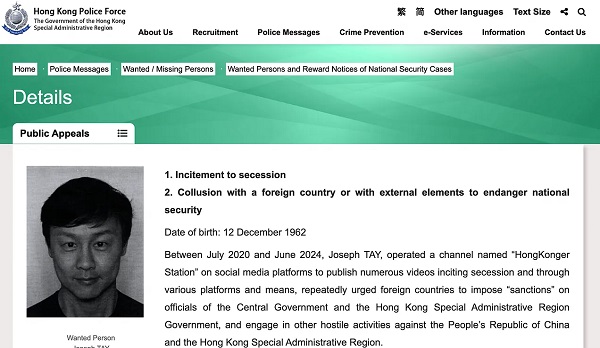
 Sam Cooper
Sam Cooper
Move follows aggressive PRC disinformation against Joe Tay, RCMP security warnings, and raises pressure on Prime Minister Mark Carney after White House meeting
In a striking escalation of Beijing’s interference in Canada’s Parliament and its global campaign to silence dissent, Hong Kong police have reportedly detained and questioned relatives of former Conservative election candidate Joe Tay—who was targeted by aggressive Chinese cyber and ground operations during the recent federal campaign, according to The Bureau’s intelligence sources.
The move to detain and question Tay’s cousin and the man’s wife in Hong Kong—reported by multiple sources, including Hong Kong Free Press—appears aimed at ramping up pressure on Liberal Prime Minister Mark Carney, whose campaign plausibly benefited from Beijing’s interference and the Liberal pledge to fight President Donald Trump’s global tariff regime.
Tay, who lost by roughly 5,000 votes to his Liberal opponent in Don Valley North, has yet to comment on the detentions. As The Bureau previously reported, the RCMP advised Tay to suspend in-person campaigning during the final week of the election due to credible threats tied to foreign interference.
The reported detentions occurred Thursday morning in the Fo Tan district of Hong Kong, where Tay’s relatives were taken to a police station for questioning. While Hong Kong police have not publicly confirmed the operation, the tactic aligns with the Chinese Communist Party’s growing use of family-based intimidation to suppress overseas dissent—a strategy documented across multiple countries by rights monitors and Western intelligence agencies.
Thursday’s detentions came just 48 hours after Carney’s closed-door meeting with U.S. President Donald Trump and Vice President J.D. Vance in Washington. Carney has not publicly commented on the content of the meeting, but according to a U.S. intelligence community source, the agenda likely included PRC political interference, trade, espionage, fentanyl trafficking, money laundering, and Chinese national security threats across North America.
Tay, 62, became a top target of Chinese interference networks during the 2025 campaign. Federal intelligence officials and The Bureau identified a coordinated foreign interference operation that promoted disinformation against Tay and other Conservative candidates across PRC-linked channels, particularly on WeChat, with the goal of depressing Chinese-Canadian voter turnout for the Conservative Party.
The SITE Task Force assessed that Tay was subject to a broader transnational repression campaign. PRC-linked accounts circulated narratives portraying Canada as a refuge for fugitives if Tay were elected—rhetoric that was echoed publicly by Liberal MP Paul Chiang, who was supported by Prime Minister Carney after those comments were publicized. Chiang’s campaign collapsed under international pressure after the RCMP announced it would review the matter.
That Beijing appears resolved to continue persecuting Tay and his family—even after his electoral defeat—points to a broader and deeper strategic objective behind this singular, confirmed case of interference. It also presents an early and consequential test for Prime Minister Carney, who campaigned on defending Canadian sovereignty while opposing Donald Trump’s tariff agenda. The timing of the escalation—detaining relatives of a defeated Canadian dissident just days after Carney’s May 6 White House meeting—suggests the PRC may be actively probing Ottawa’s resolve under new leadership.
The Bureau has extensively documented this repressive strategy. On April 10, 2025, The Bureau confirmed that Hong Kong activist Frances Hui’s parents were detained by Hong Kong national security police, following Hui’s testimony before Canada’s Parliament. Hui, now based in Washington, had previously revealed she was allegedly stalked and threatened by a suspected PRC agent.
Tay’s case fits an increasingly global pattern. The Bureau has learned that a report reviewed by Toronto police during the campaign involved a suspected stalking threat against members of Tay’s team. And now, even after democratic outcomes, the Chinese state appears determined to punish political critics through surveillance, coercion, and intimidation directed at family members—sending a clear message to diaspora communities and foreign governments alike.
The formal charges against Tay were issued by Hong Kong police in December 2024. According to official documents reviewed by The Bureau, Tay—born 12 December 1962—was charged with:
- Incitement to secession
- Collusion with a foreign country or with external elements to endanger national security
Authorities allege that between July 2020 and June 2024, Tay operated a platform called HongKonger Station, through which he published “numerous videos inciting secession” and “repeatedly urged foreign countries to impose sanctions” on officials in Beijing and Hong Kong.
The SITE Task Force confirmed that these charges were disseminated and amplified by Chinese intelligence-linked networks during Canada’s 2025 campaign, as part of a broader information warfare effort to delegitimize Tay and portray his candidacy as a national security threat to China.
At the time the charges were announced, Canada’s Foreign Affairs Minister Mélanie Joly condemned them, warning that Beijing’s extraterritorial use of its National Security Law undermined international norms and democratic principles. Since Tay’s defeat—and her party’s electoral victory—Joly has not made any further public comment.
The Bureau will seek comment from Carney and his government today and update this story.
The Bureau is a reader-supported publication.
To receive new posts and support my work, consider becoming a free or paid subscriber.
Invite your friends and earn rewards
Crime
Inside B.C.’s Cultus Lake Narco Corridor — How Chinese State-Linked Syndicates are Building a Narco Empire in Canada
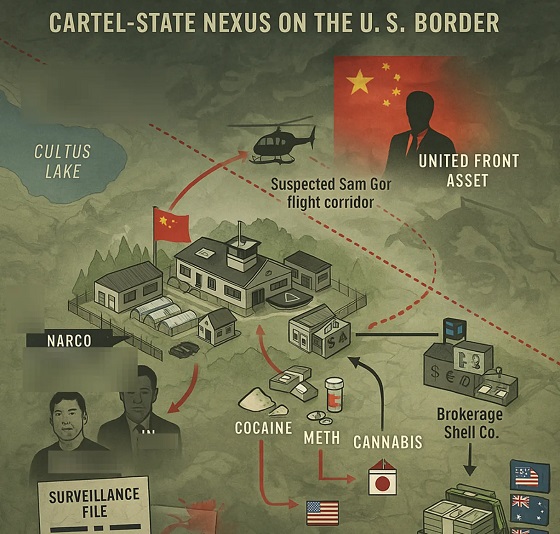
Many of the properties of concern are large-acreage farms with cannabis licenses dating back decades—once controlled by B.C. biker gangs, but quietly consolidated since the early 2000s under the influence of figures linked to the Sam Gor syndicate.
Nestled in British Columbia’s Fraser Valley, hugging the U.S. border, Cultus Lake is surrounded by towering rainforest pines—a postcard image of Canada’s serene beauty. Shaped by the last Ice Age, the south shore’s cavernous ridges form the Columbia Valley, which snakes into Washington State—sparsely populated, with no official border crossing, and peopled mostly by large ranch owners. But the pristine corridor conceals deadly secrets with geopolitical consequences.
According to multiple Canadian intelligence experts, significant Columbia Valley properties have been quietly seized as strategic high ground by associates of the notorious Sam Gor narco syndicate, operating in tandem with agents of the Chinese state’s security and foreign influence apparatus.
“The number of people—nefarious people—who have places down there, it’s quite phenomenal,” an intelligence analyst not authorized to be named said.
“It’s a very difficult place to do any surveillance on. Not a lot of properties, big properties—and anybody that doesn’t have a local license plate or something from there, they just get spotted right away.” Combine that with its location—adjacent to the U.S. border—and, the source added, “it’s got to be some of the most favorable area in the Lower Mainland to be doing any kind of cannabis stuff or drug smuggling.”
Experts describe what amounts to a special zone of Chinese crime and influence activities—tied clandestinely to Beijing in function, if not officially—a secure enclave where key properties have been tied to covert cross-border helicopter operations.
Many of the properties of concern are large-acreage farms with cannabis licenses dating back decades—once controlled by B.C. biker gangs, but quietly consolidated since the early 2000s under the influence of figures linked to the Sam Gor syndicate. The networks tied to these estates, sources say, not only profit from cannabis and sophisticated money laundering brokerages that transfer illicit proceeds—ultimately benefiting the Chinese state—but are also linked to Beijing’s so-called “CCP police station” activities, and numerous significant investigations into fentanyl, methamphetamine, heroin, cocaine, and Chinese precursor imports.
According to one source familiar with U.S. government investigations in British Columbia, one Columbia Valley property stands out with exceptional urgency. Spanning roughly 30 acres and situated steps from the U.S. border, the estate has triggered alarms among The Bureau’s national security sources—not only due to its strategic location, but because of the individuals connected to it.
Chief among them: Sam Gor himself, the syndicate’s elusive boss, a Chinese Canadian named Tse Chi Lop. Of equal or greater concern: a senior Chinese security and intelligence figure with ties to Sam Gor’s upper command, and individuals associated with Chinese mining and chemical interests and Beijing’s United Front Work Department.
According to RCMP sources, the site has also been linked to numerous narcotics investigations in Western Canada and cross-border helicopter activity into Washington State—escalating it from regional concern to a geopolitical flashpoint between Ottawa and Washington.
Among other key figures linked to the property: Peter Lap-San Pang, a Toronto-based alleged Sam Gor associate named in a British Columbia civil forfeiture case involving a suspected illegal mansion casino; and Ye Long Yong, a convicted Sam Gor “kingpin” identified in Canadian court files for importing, exporting, and trafficking heroin, methamphetamine, and cocaine. During a parole hearing, Ye told officials that “a successful person in Toronto gave” him his drug business.
The parole records noted: “There was a great deal of effort from many police organizations from all around the world, with interpreters in several languages and evidence gathered for a long period of time in order to infiltrate and bring down Mr. YE’s criminal organization.”
Also tied to the property is a United Front–associated “Big Circle Boy” contemporary of Tse Chi Lop, who was named in B.C.’s anti-money laundering inquiry as the superior of Paul King Jin—the notorious boxing gym owner, loan shark, and money laundering suspect at the center of Canada’s largest-ever casino money laundering investigation, E-Pirate.
These are just several of the “many other Sam Gor members” associated with this 30-acre farm on the U.S. border, a source said—individuals who have surfaced repeatedly in B.C.’s highest-profile organized crime investigations over the past two decades, including the E-Pirate case.
Most of the Sam Gor and Chinese state-linked suspects tied to this particular Chilliwack-area border property—with the exception of Tse Chi Lop—remain less publicly known than Paul King Jin, whose notoriety has steadily grown since the Vancouver Sun’s 2017 revelations about the RCMP’s failed E-Pirate probe. Jin later survived a high-profile targeted shooting at Richmond’s Manzo restaurant in 2020—an attack that killed his business partner, Jian Jun Zhu, another Sam Gor leader allegedly behind the Silver International operation. That Richmond-based scheme—now infamous for revealing the “Vancouver Model” of money laundering—is believed to have moved hundreds of millions in drug proceeds through a combination of government-regulated and underground casinos, with links to drug-cash banks embedded in diaspora communities across the Western Hemisphere, including Mexico, South America, and hundreds of Chinese bank accounts.
More recently, The Globe and Mail reported troubling information—verified by The Bureau—that Canadian security officials had clandestinely surveilled Jin and other Chinese businessmen privately meeting with then–Prime Minister Justin Trudeau in a Richmond hotel, during the height of the E-Pirate and related Chinese narcotics trafficking investigations in British Columbia.
The U.S. government’s concerns about transnational money laundering suspects tied to this nexus—including individuals connected to Columbia Valley properties and the private meeting with Prime Minister Trudeau—were underscored by a request for RCMP assistance in surveilling several Chinese nationals who, according to one source, arrived in Vancouver on a private jet.
Yet while Jin drew headlines in Canada, Sam Gor leader Tse Chi Lop—who holds Canadian citizenship—operated far more quietly across Vancouver, Toronto, Hong Kong, Macau, Taiwan, mainland China, and the United States prior to his arrest in the Netherlands several years ago. He has long been identified as a top figure in what former U.S. State Department investigator David Asher describes as the “command and control” layer of Chinese Communist Party-linked money laundering in Toronto and Vancouver, facilitating the financial operations of Mexican, Latin American, and Chinese cartels across the Western Hemisphere.
“Tse [Chi Lop] has a long history here [in British Columbia],” one Canadian intelligence expert said. “He’s connected to Jin and the network out here.” Regarding the elite Sam Gor members associated with significant Columbia Valley properties, they added: “There’s state interaction with some key components of those groups.”
One of the key figures associated by Canadian intelligence with the 30-acre Columbia Valley farm, Ye Long Yong, is also little known outside elite international law enforcement circles. But his role in Sam Gor’s transnational operations from Vancouver was extremely significant, an intelligence source said. Filings from his parole hearings underscore this, stating: “Mr. YE operated his criminal organization for years prior to his arrest. He demonstrated his ability to conceal his illegal activities from the authorities for many years.”
Pointing to yet another high-profile property near Cultus Lake, a different source said: “There’s another very, very significant Asian organized crime woman—she had a heavy influence out in that area, to do with cannabis. And she apparently had a lot of higher-level Chinese government connections.”
Another source, familiar with a federal investigation involving an organized crime figure flying a helicopter from the Cultus Lake region into U.S. territory, emphasized long-standing frustrations between allied agencies. “With the choppers and this area around Cultus Lake, I don’t think the Border Integrity team at Federal Serious and Organized Crime has ever truly continued paying attention,” the source said. “That’s why DEA and others are so pissed with the RCMP—not truly following up, not looking at the details. That corridor has been known for years.”
For Canadian intelligence veterans watching the pattern, the explanation points to more than simple organized crime. “This is for years to come,” one source said. “You set things in place in environments you can monitor, inside and out. Thinking like special forces—you pick the high ground, the environment where you can survey everything around you to maintain the integrity and safety of your product. That’s why the corridor is so special to organized crime. You can do that there.”
While these properties—and the alleged helicopter missions they support into the United States—offer a visceral glimpse of the threat posed by Chinese transnational networks engaged in poly-narcotics trafficking and money laundering, the deeper, state-linked financial architecture behind them is best illustrated by the RCMP’s startling findings. Investigators uncovered a global laundering network rooted in Vancouver-area brokerage houses, discreetly embedded in residential neighborhoods. These firms are tied to large-acreage land acquisitions across British Columbia used to cultivate cannabis for Asian organized crime.
Beneath the surface, authorities believe these operations fuel a broader system of poly-drug laundering, narcotics transshipment to other nations concealed within Canadian consumer exports, and coordination with Beijing’s foreign influence apparatus.
The Bureau will report next in this series on a groundbreaking investigation into the United Front brokerage system—an apparatus that facilitated narcotics trafficking from British Columbia into New York City and laundered drug proceeds from the United States back to Sam Gor and United Front networks in Vancouver.
There is mounting evidence that this same system—leveraging “legal” cannabis operations and money laundering brokerages tied to crime figures associated with Chinese consulate diplomats—is now suspected of operating not only in British Columbia but also in Ontario, with transnational reach into multiple U.S. states, including Maine.
Yet only fragments of evidence in official Canadian files hint at the “interoperability” between Chinese narco networks and the United Front Work Department, including its political influence arms.
British Columbia and Ontario have emerged as key battlegrounds where Chinese interference and triad-linked organized crime networks have deeply penetrated society. According to Canadian and U.S. experts who spoke with The Bureau, this includes the integration of the Sam Gor syndicate with Beijing’s intelligence and foreign influence apparatus, operating under the umbrella of the United Front Work Department.
Due to the sensitivity of the matter, the only expert identified in interviews is David Asher, who stated that the U.S. government views the United Front as the envelope surrounding China’s underground banking and financial networks—the same networks believed to have infiltrated TD Bank in Toronto.
Multiple Canadian police sources across British Columbia, Alberta, and Ontario confirmed that Chinese diplomats have been observed meeting with senior figures in Asian Organized Crime, including actors tied to the 30-acre “farm” property on the U.S. border near Cultus Lake.
The only known record pointing to official Canadian acknowledgment of these networks was first obtained by Global News in its reporting on Beijing’s Fox Hunt operations. The document—drafted at the request of B.C.’s Solicitor General in 2023—prompted the RCMP to prepare a classified briefing for Premier David Eby’s government. The version released under Freedom of Information legislation was completely redacted and titled: “The People’s Republic of China: Foreign Actor Influence Undertaken by the Chinese Communist Party / United Front Work Department & Interoperability with Transnational Organized Crime.”
Editor’s note: Come back to read The Bureau’s exclusive, paywalled investigation into United Front brokerage houses and illicit grow-ops—operations powered by exploited illegal immigrants.
The Bureau is a reader-supported publication.
To receive new posts and support my work, consider becoming a free or paid subscriber.
Invite your friends and earn rewards
-

 International2 days ago
International2 days agoIce Surprises – Arctic and Antarctic Ice Sheets Are Stabilizing and Growing
-
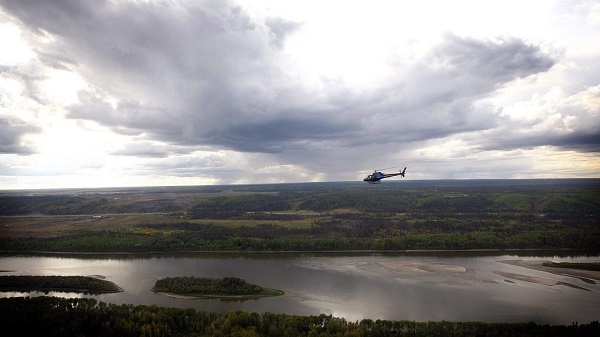
 Alberta2 days ago
Alberta2 days agoEnergy projects occupy less than three per cent of Alberta’s oil sands region, report says
-

 Energy2 days ago
Energy2 days agoCarney’s energy superpower rhetoric falls flat without policy certainty
-

 Energy2 days ago
Energy2 days agoOil tankers in Vancouver are loading plenty, but they can load even more
-

 2025 Federal Election1 day ago
2025 Federal Election1 day agoGroup that added dozens of names to ballot in Poilievre’s riding plans to do it again
-

 Alberta2 days ago
Alberta2 days agoCharges laid in record cocaine seizure
-

 2025 Federal Election1 day ago
2025 Federal Election1 day agoCarney says Liberals won’t make voting pact with NDP
-

 COVID-192 days ago
COVID-192 days agoStudy finds nearly half of ‘COVID deaths’ had no link to virus





